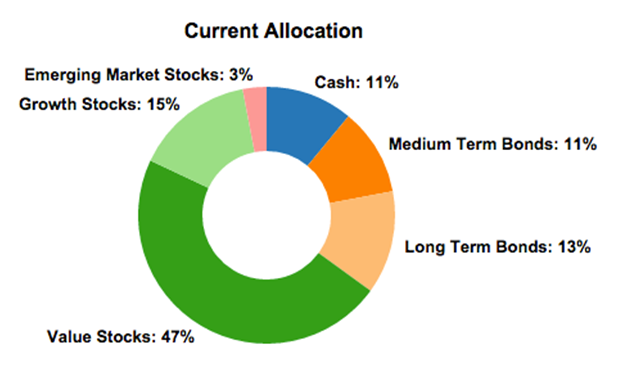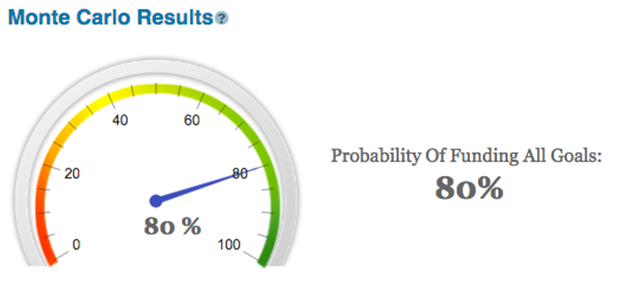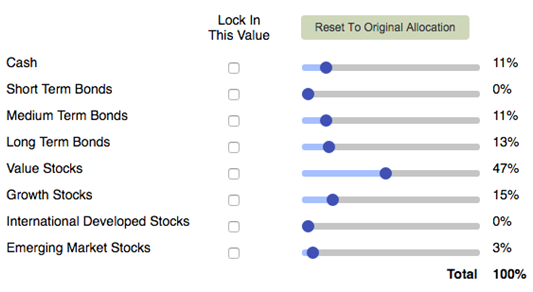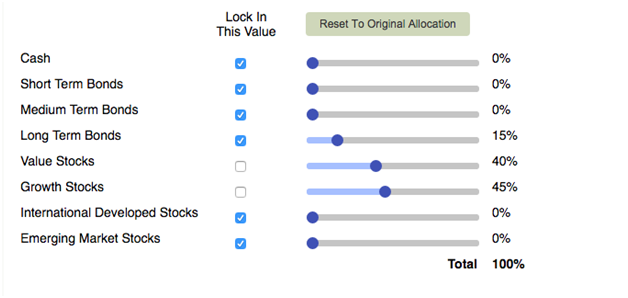Key Points
- Asset allocation is a fancy way of referring to where you're investing your money.
- Your risk tolerance will probably guide your asset allocation choices.
- Your asset allocation choices will have a huge effect on the probability of your retirement plan's success.
When we talk about "asset allocation," we are, broadly speaking, referring to where you're investing your money. Over longer periods, the more willing you are to take some risks with your money in the stock market, the better your returns will be.
You might think that money in the bank, for example, is as safe as it gets. But at the rates banks are paying on savings accounts and CDs currently, inflation will chip away at its purchasing power over time. The value of the money will increase at the interest rate the bank is paying you, so it might feel like a safe, slowly increasing investment. But inflation has been around 3% annually over time, meaning that, in actuality, the value of the bank account will drop.
If you are extremely averse to risk and have a lot of money, that sort of scenario could still work for you in retirement--that is, essentially losing money each year on your bank account even as you draw down from it. But most of us can't make that work. We have constraints, either time or money or both, that force us to take on some risk in order to meet our spending needs in retirement.
The Risk Of Not Taking On Enough Risk
If you have the risk tolerance (which generally means that you can handle the ups and downs of the stock market without losing sleep or losing your mind), and you have enough years between you and retirement, it's generally best to be as aggressive as you are willing to be with your investments. That savings account we mentioned above might get you 1% or so annually these days. That's not much, but at least you know it's not going to suddenly drop in value by 5% tomorrow, and then zig and zag on a daily basis for as long as you have the money.
The stock market, on the other hand, can do just that. But that's just part of the deal, and it's OK: Over time, the additional risk should lead to additional reward. The key is to get that risk/reward balance right. New retirees heading into the 2008 market correction with a large chunk of money in the stock market got clobbered. On the other hand, if you're not aggressive enough with your investment decisions early on in your working years, you could end up working longer than you otherwise might have needed to.
Moving Some Money Around
Let's take a look at a hypothetical couple that is starting to think about retirement. They've done a lot of the right things in terms of saving and investing, and want to see if they will be able to retire early, at around age 58. They are currently 50, and have about $850,000 in invested assets, and think they'll be spending around $80,000 a year once retired.
By asset class, here's what their portfolio looks like now:
 What's in your portfolio? WealthTrace can help you find out. Learn more.
What's in your portfolio? WealthTrace can help you find out. Learn more.
So often, the issue people trying to retire run into is not one of where to put the money, but rather having enough money in the first place. That is probably not a problem with this couple.
Indeed, when I run their plan through our Monte Carlo simulator, the results aren't quite where we would like to see them, but they're not too bad:

A Monte Carlo simulation runs through 1,000 scenarios and calculates the probability of a plan's success. Learn more.
Most likely, a few tweaks to our couple's asset allocation will move the needle a little further into the green.
But there's a trade-off to those tweaks. The couple is probably going to have to take on a bit more risk--as measured by volatility--in their portfolio. In the pie chart above, cash makes up 11% of their overall assets. We will have to put that money to work in stocks, and probably will need to dial back the bond portion of the portfolio as well.
I ran the couple's portfolio through WealthTrace's Asset Allocation What-If Scenario generator. This new tool allows you to see how changes to a portfolio's asset allocation might affect the probability of success of a retirement plan.
We're starting here . . .

. . . and, after some experimenting, we land here:

So we're dropping the cash and cutting back on the bond holdings, which frees up funds for stock investments. And, after putting the changes through WealthTrace, here's what happens:

Our probability of success jumps by nine percentage points, from 80% to 89%. Not only that, our worst quartile and best quartile investment value amounts jump substantially.
Allocation Matters
When putting together an actual plan, there would be plenty of factors to consider before making such a radical change to the asset allocation. Still, the point remains: Your asset allocation choices will have a dramatic effect on your retirement plans.
Make sure you have the right tools for the job. WealthTrace can help you run through asset allocation scenarios and other what-ifs that take a lot of the guesswork out of making a financial plan. Learn more.